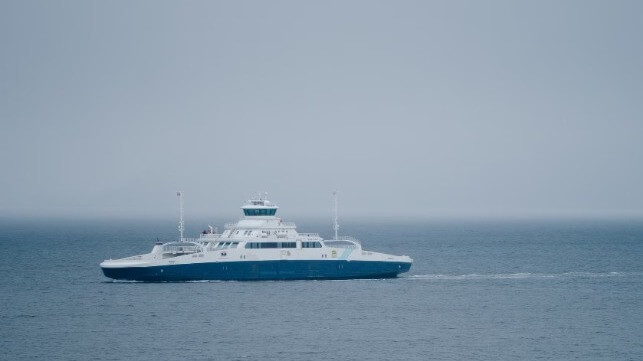Ferry Operator Looks to Self-Driving Tech to Help Solve Staff Shortage
A reduced crew workload is one of many benefits that Norwegian operator Torghatten expects from autonomy

The Norwegian ferry operator Torghatten is planning to use self-driving technology on a route near Trondheim, and has signed an agreement with the experienced autonomous-shipping team at Kongsberg to develop the system.
Torghatten plans to retrofit self-driving technology onto existing car ferries on its Flakk-Rorvik route, which departs from a terminal about six miles west of central Trondheim. The service connects the city with the Fosen peninsula, four miles away on the other side of the Trondheim Fjord. Without a ferry crossing, it would be a three-hour drive around the fjord to reach the same point on the peninsula, so the route is important to the region's communities.
Under the agreement, the ferries will use Kongsberg's auto-docking, auto-crossing, collision avoidance and situational awareness technology for vessel autonomy. Torghatten hopes that the system will help solve serious staff shortages, within the guidelines laid out by regulations.
"Self-driving ferries can help increase safety and punctuality, reduce energy consumption, and take over routine tasks from the crew, who can then spend their attention on the sea instead of on the dashboard and navigation controls," said the ferry operator's technology director, Jan-Egil Wagnild. "At the same time, recruitment in our industry is generally far too weak, and we all struggle to get hold of enough people."
Kongsberg has developed multiple autonomy projects before, including the all-electric autonomous container feeder Yara Birkeland and the two electric cargo ferries for Norwegian grocery operator ASKO. In conjunction with Wilhelmsen, Kongsberg also runs a remote operations center for autonomous vessels in Horten, Norway, for controlling vessels that are unmanned. (Torghatten's ferries will still be manned.)

that matters most
Get the latest maritime news delivered to your inbox daily.
But there is still more to be done, said Kongsberg SVP of autonomous solutions Pal Andre Eriksen.
"The basic technology is already in place with us, but for it to be optimized and further developed, we are dependent on rolling it out on commercial vessels and building an industry around what can be commercialized for a global market," said Eriksen. "We are very optimistic about this project and look forward to it giving a positive boost to the maritime authorities' work to adapt the regulations."
